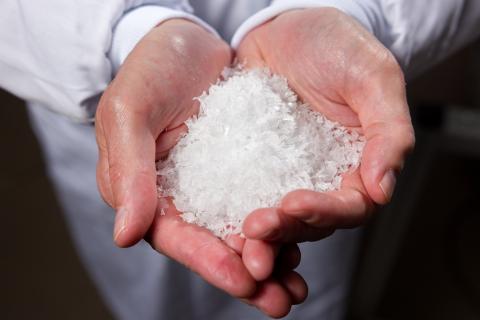What if we could help the global plastic waste problem and the transportation industry with the same technology?
A team of scientists from the U.S. Department of Energy’s Ames National Laboratory are doing just that. The team, led by Aaron Sadow and Wenyu Huang, recently developed a chemical conversion process that makes diesel out of plastic waste.
Plastics are important materials with properties that lead to many applications, including safe food storage, lightweight electronics, and sanitary medical equipment. Among its many uses, disposable plastic products are a popular choice since they are less expensive to make and transport than goods made from other heavier or delicate materials. The waste from these “single-use products” is the primary problem with plastics. Discarded plastics last thousands of years in landfills, and partial degradation and poor waste management have leached plastic into the natural environment as well as into our drinking water and food, causing hazards for wildlife and people alike.
“We are converging on a crisis made worse by emissions impacting air quality and climate change that requires us to use our natural resources more efficiently, including the fossil resources used to make plastics and liquid fuels, said Sadow. “But by looking wholistically at energy and fuels, chemicals and materials, and their natural supply, we can design sustainable solutions for our plastic waste and energy problems.”
Transportation, manufacturing, construction, and agriculture industries rely heavily on diesel to supply power on demand, create goods, and transport products and people across the world. One way that scientists are working to improve the sustainability and reduce the environmental impacts of the transportation industry is by exploring alternative fuels sources like this plastic-derived diesel.
The team developed a one-step process that turns plastic waste into diesel directly. “There is a competitive advantage to making it from plastic if you can bypass the massive refineries, and that's exactly what our technology does,” Sadow explained.

The process they developed is based on catalysis, which involves using a certain chemical (a catalyst) to help break apart the polymers that form the plastic waste. Sadow explained that conventional catalysts create a variety of products that need to go through energy-intensive separation processes to make useful products. The catalysts used in the Ames Lab process, however, are selective in how they break apart the polymers. This selectivity means the desired chemical comes directly from the reaction, in this case, diesel fuel.
This process for diesel production is more environmentally friendly and efficient than making diesel from crude oil. It also results in a cleaner-burning diesel. The diesel is cleaner because it has no sulfur. “It's hard to remove sulfur from crude oil. That's an expensive part of the refining process,” Huang said. “Plastic inherently doesn't have sulfur in it because it's already refined.”
This cleaner diesel can help the transportation industry by improving emissions and providing an alternative to fossil fuels. Simultaneously, fewer plastics will go to landfills and into the environment.
Multiple patent applications have been filed on aspects of this technology. For more information, contact the Ames National Laboratory Innovation Partnerships Program at ipp@ameslab.gov.
Ames National Laboratory is a U.S. Department of Energy Office of Science National Laboratory operated by Iowa State University. Ames Laboratory creates innovative materials, technologies, and energy solutions. We use our expertise, unique capabilities, and interdisciplinary collaborations to solve global problems.
Ames National Laboratory is supported by the Office of Science of the U.S. Department of Energy. The Office of Science is the single largest supporter of basic research in the physical sciences in the United States and is working to address some of the most pressing challenges of our time. For more information, please visit https://energy.gov/science.
